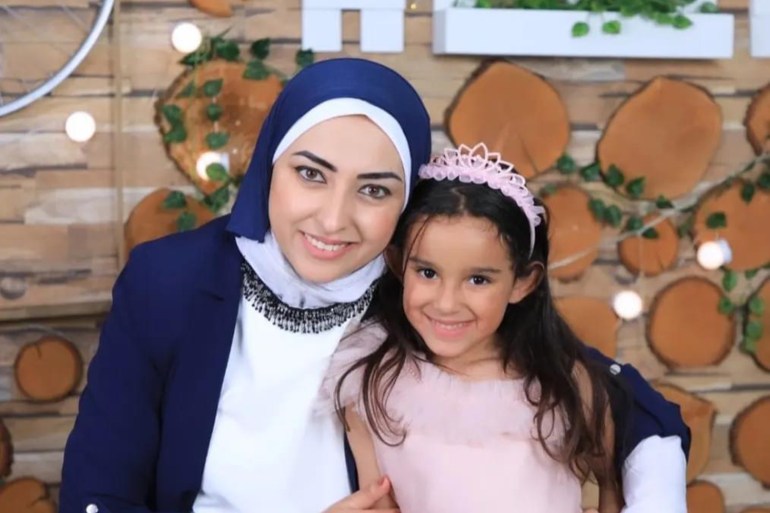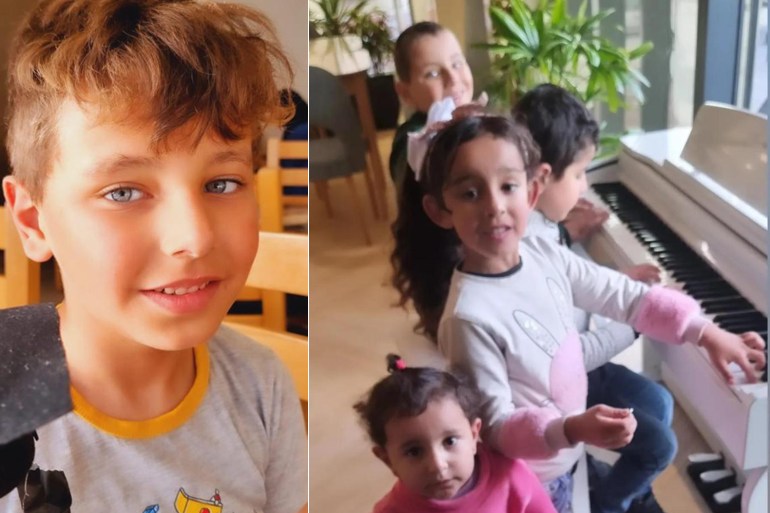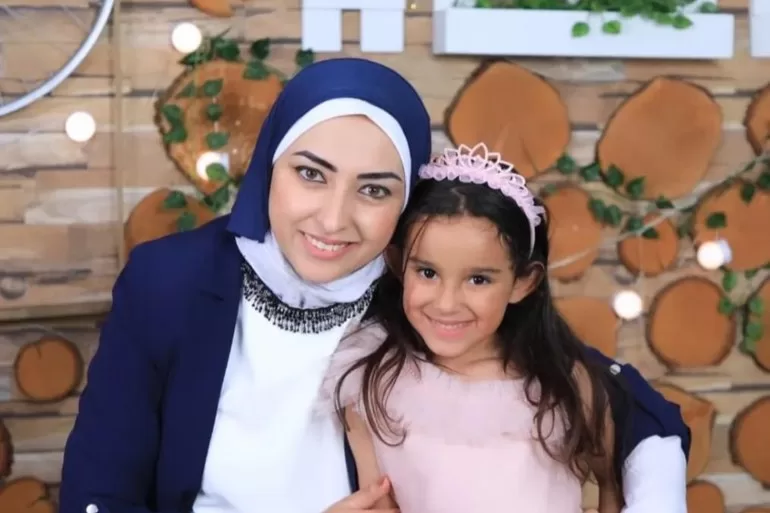A mother who has borne the pain of separation from her children, wept at the sight of them slipping into malnutrition and stayed up all night to try to reassure them that they were “safe” as Israel’s planes continued to drop bombs overhead.
Or a mother who has lost her children in Israel’s war on Gaza.
‘Mama, try to get us out’
Alaa el-Qatrawi, 33, sits quietly, present in body but it is obvious that her mind is elsewhere. A few months ago, all four of her children were killed …
The PhD holder in Arabic studies is separated from her husband of nearly 10 years, Musa Qandil, and had been able to see the children only some of the time during the war.
Looking around with bloodshot eyes, she recites her children’s names: “Yamen, eight years old. The twins Orchid and Kanan, six years old. And Carmel, three years old.”
In early December, when the children were with their father, who took them to Khan Younis for their safety, Alaa heard that Israeli tanks were getting closer to the house where they were staying. One day, Israeli forces stormed the house and attacked her ex-husband and his brothers. They said the soldiers beat them severely and stole money, mobile phones and gold.
A university-age cousin managed to hide her phone, and on December 13, the children used it to contact Alaa, terrified of the fighting raging around them. “Mama, try to get us out of here,” she remembers them begging.
But Alaa says she was not able to get help from two of the international humanitarian organisations in Gaza, neither of which could get into the area where the house was.
“I would fantasise that I could make myself invisible and go get them out. I didn’t know what to do. … They were asking me for help, but I couldn’t do anything. When I remember their voices, I wish I could die or that this was a dream I could wake up from,” she weeps.
She did not hear from them or find out what happened until, a month later, her brother-in-law was able to get to the house only to find it destroyed and the smell of decomposing bodies emanating from it.
Yamen, Orchid, Kanan and Carmel
While speaking to Al Jazeera about Mother’s Day, Alaa talks about her children in the present tense.
“My eldest, when he was in first grade, wrote me a beautiful letter with the words ‘My beloved mother’. It’s still with me, and I will never forget it.
“Yamen just turned eight. He and I barely survived his birth. I was rushed for an emergency C-section, and we found out later that the doctors expected only one of us to make it.

“Every year on his birthday, I write him a card, telling him of the miracle of his birth. He’s my miracle. He’s so beautiful, blond, and with these wide blue eyes, he looks like my younger brother and is the kindest out of his siblings,” she says, starting to smile.
“Kenan and Orchid had only been in school for one month, in first grade, when the war began. But they’re so smart and funny. Kenan loves fruit, and sometimes I would put some next to him when he sleeps so he has a snack on hand whenever he wakes up.
“They’re beautiful. Kenan is a little taller than Orchid, who has this golden skin and long, black hair. I love how they compete with each other in everything.
“The year before, when they were in kindergarten, they brought me flowers for Mother’s Day, and Orchid gave me chocolates. ‘Mama, I bought you chocolate because I know you like it with coffee,’ she said. She had saved up. I’m sure she would have grown up to be a doctor,” Alaa seemed to startle herself by referring to her daughter in the past tense.
“Carmel, she’s from the heavens and loves masbahas [prayer beads] like I do. We were out once with a friend of mine who had a masbaha that looked like mine, and Carmel took it, thinking it was mine,” Alaa says, smiling wider as tears roll out of the corners of her eyes.
“Everything Carmel is is beautiful. But she’s tough too, you know. She can get her older siblings to do what she wants.”
‘What can a grieving mother say?’
Alaa, who is also a poet, is a teacher in Gaza and had been trying to put together a plan to get her children out of Gaza and move them to Dubai for a better future.
“I had just been in the UAE before the war, working on the process. I bought a princess dress for Orchid and toys for the other kids. The toys are unused and the dress practically unworn because it’s more of a summer dress, and now summer will come and Orchid isn’t here to wear the dress.”
She stops to cry.
“Orchid was so proud of me because I’m a poet. She used to tell me she wanted to be a poet and go on TV.

She truly was an orchid. I chose a poetic name for her, and she grew into it.”
Despite having used words to express herself for much of her life, Alaa finds it nearly impossible to speak about her children and losing them.
“What can a grieving mother say about her children?” she asks. “I used to bring it out in writing, … a poem or some prose. Since the beginning of this war, I’ve not written. I’m in shock, feeling we’re alone in this war.
“In the 2014 war, I wrote a book called Letters Under War and daily war diaries, but this time, no. I don’t think anyone cares about it.
“I don’t want to talk to people. I’m content with prayer and talking to God to tell Him what I need, for He is the all-knowing and all-seeing of what is hidden and the great calamity that befell Gaza.
“Sometimes you wish that the war would stop for a minute, so you can get a hug from a child you love.”
